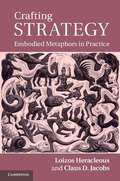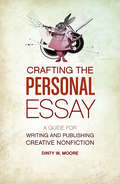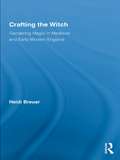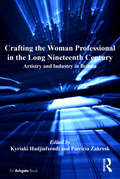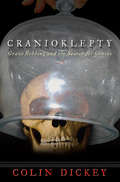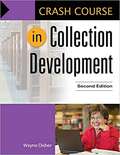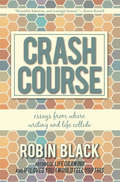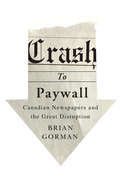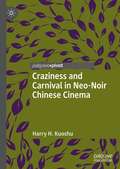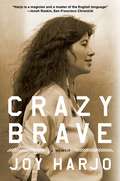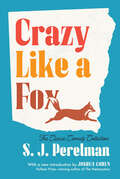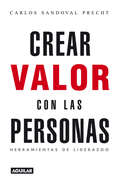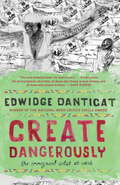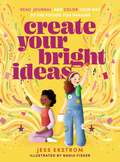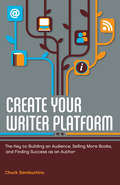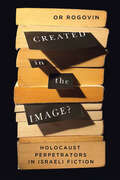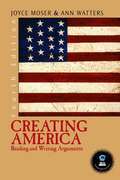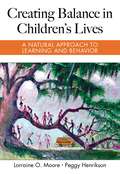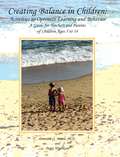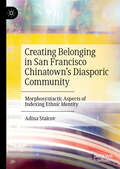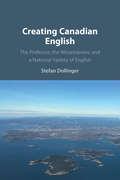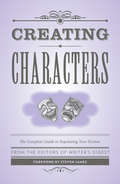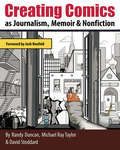- Table View
- List View
Crafting Strategy: Embodied Metaphors in Practice
by Loizos Heracleous Claus D. JacobsThe rationalist approach to strategizing emphasizes analytical and convergent thinking. Without denying the importance of this approach, this book argues that strategists must learn to complement it with a more creative approach to strategizing that emphasizes synthetic and divergent ways of thinking. The theoretical underpinnings of this approach include embodied realism, interpretivism, practice theory, theory of play, design thinking, as well as discursive approaches such as metaphorical analysis, narrative analysis, dialogical analysis and hermeneutics. The book includes in-depth discussions of these theories and shows how they can be put into practice by presenting detailed analyses of embodied metaphors built by groups of agents with step-by-step explanations of how this process can be implemented and facilitated. The link between theory and practice is further supported by the inclusion of several vignettes that describe how this approach has been successfully employed in a number of organizations, including BASF and UNICEF.
Crafting The Personal Essay: A Guide for Writing and Publishing Creative Non-Fiction
by Dinty W. MooreAward winning essayist Scott Russell Sanders once compared the art of essay writing to "the pursuit of mental rabbits"#151;a rambling through thickets of thought in search of some brief glimmer of fuzzy truth. While some people persist in the belief that essays are stuffy and antiquated, the truth is that the personal essay is an ever-changing creative medium that provides an ideal vehicle for satisfying the human urge to document truths as we experience them and share them with others#151;to capture a bit of life on paper. Crafting the Personal Essayis designed to help you explore the flexibility and power of the personal essay in your own writing. This hands-on, creativity-expanding guide will help you infuse your nonfiction with honesty, personality, and energy. You'll discover: An exploration of the basics of essay writing Ways to step back and scrutinize your experiences in order to separate out what may be fresh, powerful, surprising or fascinating to a reader How to move past private "journaling" and write for an audience How to write eight different types of essays including memoir, travel, humor, and nature essays among others Instruction for revision and strategies for getting published Brimming with helpful examples, exercises, and sample essays, this indispensable guide will help your personal essays transcend the merely private to become powerfully universal.
Crafting the Witch: Gendering Magic in Medieval and Early Modern England (Studies in Medieval History and Culture)
by Heidi BreuerThis book analyzes the gendered transformation of magical figures occurring in Arthurian romance in England from the twelfth to the sixteenth centuries. In the earlier texts, magic is predominantly a masculine pursuit, garnering its user prestige and power, but in the later texts, magic becomes a primarily feminine activity, one that marks its user as wicked and heretical. This project explores both the literary and the social motivations for this transformation, seeking an answer to the question, 'why did the witch become wicked?' Heidi Breuer traverses both the medieval and early modern periods and considers the way in which the representation of literary witches interacted with the culture at large, ultimately arguing that a series of economic crises in the fourteenth century created a labour shortage met by women. As women moved into the previously male-dominated economy, literary backlash came in the form of the witch, and social backlash followed soon after in the form of Renaissance witch-hunting. The witch figure serves a similar function in modern American culture because late-industrial capitalism challenges gender conventions in similar ways as the economic crises of the medieval period.
Crafting the Woman Professional in the Long Nineteenth Century: Artistry and Industry in Britain
by Kyriaki Hadjiafxendi Patricia ZakreskiOver the course of the nineteenth century, women in Britain participated in diverse and prolific forms of artistic labour. As they created objects and commodities that blurred the boundaries between domestic and fine art production, they crafted subjectivities for themselves as creative workers. By bringing together work by scholars of literature, painting, music, craft and the plastic arts, this collection argues that the constructed and contested nature of the female artistic professional was a notable aspect of debates about aesthetic value and the impact of industrial technologies. All the essays in this volume set up a productive inter-art dialogue that complicates conventional binary divisions such as amateur and professional, public and private, artistry and industry in order to provide a more nuanced understanding of the relationship between gender, artistic labour and creativity in the period. Ultimately, how women faced the pragmatics of their own creative labour as they pursued vocations, trades and professions in the literary marketplace and related art-industries reveals the different ideological positions surrounding the transition of women from industrious amateurism to professional artistry.
Crafty TV Writing: Thinking Inside the Box
by Alex EpsteinA professional TV writer's real-world guide to getting paid to write great television"No need for me to ever write a book on TV writing. Alex Epstein has covered it all . . . along with a few things I wouldn't have thought of. Save yourself five years of rookie mistakes. Crafty TV Writing and talent are pretty much all you'll need to make it."—Ken Levine, writer/producer, MASH, Cheers, Frasier, The Simpsons, Wings, BeckerEveryone watches television, and everyone has an opinion on what makes good TV. But, as Alex Epstein shows in this invaluable guide, writing for television is a highly specific craft that requires knowledge, skill, and more than a few insider's tricks.Epstein, a veteran TV writer and show creator himself, provides essential knowledge about the entire process of television writing, both for beginners and for professionals who want to go to the next level. Crafty TV Writing explains how to decode the hidden structure of a TV series. It describes the best ways to generate a hook, write an episode, create characters the audience will never tire of, construct entertaining dialogue, and use humor. It shows how to navigate the tough but rewarding television industry, from writing your first "spec" script, to getting hired to work on a show, to surviving—even thriving—if you get fired. And it illuminates how television writers think about the shows they're writing, whether they're working in comedy, drama, or "reality."Fresh, funny, and informed, Crafty TV Writing is the essential guide to writing for and flourishing in the world of television.
Cranioklepty
by Colin DickeyThe after-death stories of Franz Joseph Haydn, Ludwig Beethoven, Swedenborg, Sir Thomas Browne and many others have never before been told in such detail and vividness.Fully illustrated with some surprising images, this is a fascinating and authoritative history of ideas carried along on the guilty pleasures of an anthology of real-after-life gothic tales.Beginning dramatically with the opening of Haydn's grave in October 1820, cranioklepty takes us on an extraordinary history of a peculiar kind of obsession. The desire to own the skulls of the famous, for study, for sale, for public (and private) display, seems to be instinctual and irresistible in some people. The rise of phrenology at the beginning of the 19th century only fed that fascination with the belief that genius leaves its mark on the very shape of the head.
Crash Course in Collection Development (Crash Course series)
by Wayne DisherThis professional volume covers all aspects of collection development and management in the public library, from gathering statistics to design a collection that meets community needs, to selecting materials, managing vendor relations, understanding the publishing industry, and handling complaints. Author Wayne Disher provides public librarians―especially those without the benefit of academic training―access to the tools needed for their success and ensure their collections are beneficial to the public they serve. <p><p> The second edition features two new chapters on digital curation and cooperative collection development. Additional updates include helpful information on infographics, more budgeting formulas, and a section on core collections, as well as content covering eBooks, electronic storage, and digital rights management. Chapters discuss subjects such as marketing the collection to patrons, book repair, and handling censorship issues when collections are challenged.
Crash Course: Essays From Where Writing and Life Collide
by Robin BlackRobin Black's path through loss and survival delivered her to the writer's life. Agoraphobia, the challenges of parenting a child with special needs, and the legacy of a formidable father all shaped that journey. In these deeply personal and instructive essays, the author of the internationally acclaimed If I loved you, I would tell you this and Life Drawing explores the making of art through the experiences of building a life. Engaging, challenging, and moving, Crash Course is full of insight into how to write-and why.From "Autumn, 1972, A Moment at Which I Became a Writer":I sense, even now, the reverberations of a kind of shattering of my foundation and a quick rebuild, a change at a molecular level of who I understood myself to be. No longer someone who could look at another person without wondering what their life was like, but someone with a new curiosity about what people's stories might actually be.Robin Black is the author of the story collection, If I loved you, I would tell you this and the novel Life Drawing, both critically acclaimed, and both published in multiple languages. She has developed a loyal, enthusiastic following for her essays on life and writing, online and in such publications as the New York Times, the Chicago Tribune, and O Magazine. She lives with her husband in Philadelphia, Pennsylvania, where the house is always open for their three grown children.
Crash to Paywall
by Brian GormanIn 2014, when Postmedia acquired Quebecor's Sun Media newspaper and online assets, there was a sense that the recent history of newspapers was repeating itself not as comedy or tragedy, but as eulogy. Crash to Paywall shows that while the newspaper business was weakened by decreases in advertising revenues and circulation, much of its problems stem from self-inflicted damage and business practices dating back to the 1970s. Brian Gorman explores the Canadian newspaper industry crisis and the relationship between the news media and the public. He challenges both the popular mantra that a "perfect storm" of unforeseen circumstances blindsided a declining industry and the narrative that readers were abandoning newspapers, causing advertisers to turn away from "dying" media. Gorman argues that observers had been warning for decades that the business was creating its own problems by acquiring ever-larger debt and shareholder obligations while steadily cutting back on journalists' resources. Finally, by providing journalism for free online, newspaper companies devalued their most important resource and impaired their profitable print products. With dozens of interviews conducted with leading Canadian journalists and editors, Crash to Paywall brings to light the many misconceptions, generalizations, omissions, and highly suspect conclusions about the present state of newspapers and their future.
Crash to Paywall: Canadian Newspapers and the Great Disruption
by Brian GormanIn 2014, when Postmedia acquired Quebecor's Sun Media newspaper and online assets, there was a sense that the recent history of newspapers was repeating itself not as comedy or tragedy, but as eulogy. Crash to Paywall shows that while the newspaper business was weakened by decreases in advertising revenues and circulation, much of its problems stem from self-inflicted damage and business practices dating back to the 1970s. Brian Gorman explores the Canadian newspaper industry crisis and the relationship between the news media and the public. He challenges both the popular mantra that a "perfect storm" of unforeseen circumstances blindsided a declining industry and the narrative that readers were abandoning newspapers, causing advertisers to turn away from "dying" media. Gorman argues that observers had been warning for decades that the business was creating its own problems by acquiring ever-larger debt and shareholder obligations while steadily cutting back on journalists' resources. Finally, by providing journalism for free online, newspaper companies devalued their most important resource and impaired their profitable print products. With dozens of interviews conducted with leading Canadian journalists and editors, Crash to Paywall brings to light the many misconceptions, generalizations, omissions, and highly suspect conclusions about the present state of newspapers and their future.
Craziness and Carnival in Neo-Noir Chinese Cinema (Chinese Literature and Culture in the World)
by Harry H. KuoshuCraziness and Carnival in Neo-Noir Chinese Cinema offers an in-depth discussion of the “stone phenomenon” in Chinese film production and cinematic discourses triggered by the extraordinary success of the 2006 low-budget film, Crazy Stone. Surveying the nuanced implications of the film noir genre, Harry Kuoshu argues that global neo noir maintains a mediascape of references, borrowings, and re-workings and explores various social and cultural issues that constitute this Chinese episode of neo noir. Combining literary explorations of carnival, postmodernism, and post-socialism, Kuoshu advocates for neo noir as a cultural phenomenon that connects filmmakers, film critics, and film audiences rather than an industrial genre.
Crazy Brave: A Memoir
by Joy HarjoIn this transcendent memoir, grounded in tribal myth and ancestry, music and poetry, Joy Harjo, one of our leading Native American voices, details her journey to becoming a poet. Born in Oklahoma, the end place of the Trail of Tears, Harjo grew up learning to dodge an abusive stepfather by finding shelter in her imagination, a deep spiritual life, and connection with the natural world. She attended an Indian arts boarding school, where she nourished an appreciation for painting, music, and poetry; gave birth while still a teenager; and struggled on her own as a single mother, eventually finding her poetic voice. Narrating the complexities of betrayal and love, Crazy Brave is a memoir about family and the breaking apart necessary in finding a voice. Harjo's tale of a hardscrabble youth, young adulthood, and transformation into an award-winning poet and musician is haunting, unique, and visionary.
Crazy Like a Fox: The Classic Comedy Collection
by S. J. PerelmanA beloved classic returns: S. J. Perelman's own selection of the very best of his hilarious stories and sketchesPulitzer Prize–winning author Joshua Cohen (The Netanyahus) reintroduces America's zaniest humorist to a new generation of readersWhen asked about himself the writer Sidney Joseph Perelman once quipped, "before they made him, they broke the mold." Nowhere is S. J. Perelman's one-of-a-kind, madcap sensibility—his gift for wordplay, witticism, spoofery, and sheer nonsense—on better display than in his classic collection Crazy Like a Fox, here restored to print for the first time in decades.In a playful, loving tribute to the funny man, novelist Joshua Cohen—also an erudite wordsmith and punster—introduces Perelman&’s sui generis comic pieces to a new generation of readers, certain to fall in love with the writer whom The New York Times once noted for his ability &“to transform the common cliché or figure of speech into an exploding cigar.&” Included here are such beloved classics as:the Joycean virtuoso performance &“Scenario&”&“A Farewell to Omsk,&” Perelman's hilarious homage to Dostoevskyand &“Farewell, My Lovely Appetizer," his side-splitting send-up of the hardboiled detective fiction of Raymond ChandlerHere is Perelman's own selection of the very best of his inimitable humor, restored to print for the first time in decades.
Crear valor con las personas
by Carlos SandovalCrear valor con las personas aborda el tema del liderazgo desde cinco aspectos claves, que son fundamentales a la hora de construirnos como líderes. Crear valor con las personas aborda el tema del liderazgo desde cinco aspectos claves, son fundamentales a la hora de construirnos como líderes: la personalidad, el ciclo efectivo, lo facilitador, la transformación y el cambio. Usando ejemplos didácticos, casos particulares y ejercicios, Carlos Sandoval Precht, asume desde la primera página que el éxito de una empresa, sea ésta un negocio internacional o una banda de rock, se define por la personalidad de su líder. Y ser líder no es saber mandar ni ser simpático o pesado, sino saber darle valor a cada persona que trabaja con nosotros.
Create Dangerously: The Immigrant Artist at Work (Vintage Contemporaries)
by Edwidge DanticatA New York Times Notable BookA Miami Herald Best Book of the YearIn this deeply personal book, the celebrated Haitian-American writer Edwidge Danticat reflects on art and exile. Inspired by Albert Camus and adapted from her own lectures for Princeton University's Toni Morrison Lecture Series, here Danticat tells stories of artists who create despite (or because of) the horrors that drove them from their homelands. Combining memoir and essay, these moving and eloquent pieces examine what it means to be an artist from a country in crisis.From the Trade Paperback edition.
Create Your Bright Ideas: Read, Journal, and Color Your Way to the Future You Imagine
by Jess EkstromThis interactive book for energetic, creatively minded 8- to 12-year-olds from entrepreneur Jess Ekstrom uses inspiring stories, journaling prompts, coloring pages, and creative ideas to show kids that if they want something to be different in the world, they can do something about it today! Water the seeds of creativity in your child through this engaging book about having a positive growth mind-set. In Create Your Bright Ideas, Jess motivates kids to be creators and ambitious doers who know they are never too young to change the world. Create Your Bright Ideas helps kids discover their passions by offeringjournaling prompts to bring out your child's bright ideas;personal stories about entrepreneurship and perseverance;practical advice for discovering and using their unique gifts; andmotivational quotes paired with beautiful coloring pages from illustrator Nadia Fisher that can be cut out of the book for easy display.Jess never predicted that her time selling cookies and lemonade as a kid was foreshadowing founding her company Headbands of Hope, which helps millions of kids with illnesses. It wasn't always smooth sailing, but each obstacle she faced put her on an unexpected path of inspiration, helping her discover the amazing things she could become and do, like starting multiple businesses, writing a book, and helping millions of people feel more confident in their story. Now Jess shows kids how to channel their own energy and unique interests to create something meaningful. With inspiration from Jess's bestselling book Chasing the Bright Side, this jump-right-in guide created just for kids and tweens is a great gift forChristmas and birthdays;elementary- and middle-school graduations; andyoung world changers who want to do something lasting but don't know where to start.Create Your Bright Ideas is a perfect size to fit in a backpack, ready to be pulled out whenever inspiration strikes--during car rides, while waiting for the bus, for reading time at school, or right before bed. A powerful and fun reminder that many CEOs and nonprofit leaders started their careers with a lemonade stand, Create Your Bright Ideas takes kids on an exciting journey of purpose, self-discovery, and bold action.
Create Your Writer Platform: The Key to Building an Audience, Selling More Books, and Finding Success as an A uthor
by Chuck SambuchinoCreating a platform isn't just beneficial--it's essential! In today's world of blogging, websites, Twitter feeds, and Facebook updates, building a writer platform from the ground up can seem a daunting task. Never fear--author and editor Chuck Sambuchino provides expert, practical advice for increasing your visibility, selling more books, and launching a successful career. In Create Your Writer Platform, you'll learn: The definition of a platform--and why you should start building one now. How to harness the 12 Fundamental Principles of Platform. "Old School" and "New School" approaches to platform, from article writing and conference speaking to website development, blog posts, and social media avenues. How to develop a platform for nonfiction, fiction, and memoir. In addition to Chuck's invaluable insights, you'll also find 12 case studies from authors with effective platforms, as well as professional advice from literary agents. If you're serious about building a platform tailored to you and your writing--a platform that's going to help you succeed as a writer--look no further than Create Your Writer Platform.
Created in the Image?: Holocaust Perpetrators in Israeli Fiction (McGill-Queen’s Azrieli Institute of Israel Studies Series #3)
by Or RogovinThe turn of the twenty-first century saw the rise of a brand of fiction that centres the experience and perspective of the perpetrator, thereby humanizing this character and granting it the capability to evoke our empathy. The vast scholarship published on this phenomenon, however, fails to consider Israeli writing, and with it some of the most complex characterizations of Holocaust perpetrators, imagined from the unparalleled position of a nation that was shaped from its very birth by the legacy of Holocaust victimhood and survival.In Created in the Image? Or Rogovin situates Israeli literary responses to the Holocaust in the canon of perpetrator fiction for the first time. Since the state’s establishment in 1948, perpetrator characterization in Israeli fiction has demonstrated a remarkable development that corresponds to changing circumstances, from the Eichmann trial to the First Intifada. While early examples depicted perpetrators stereotypically and minimally - as seen in Ka-Tzetnik’s demonic and bestial Nazis in Salamandra and in the amorphous persecutor figures in Aharon Appelfeld’s stories - since the mid-1980s these characters have been created in the human image, as nuanced and multidimensional individuals. The turning point came with Herr Neigel, the sensitive and self-contradictory commandant in David Grossman’s See Under: Love (1986), followed by likewise multifaceted and humanized perpetrators in fiction by A.B. Yehoshua, Savyon Liebrecht, and Amir Gutfreund.Anchored in theoretical and comparative perspectives, Created in the Image? presents a groundbreaking analysis of the poetic mechanisms, moral implications, and historical contexts of this paradigm shift in the Israeli literary response to the Shoah.
Creating America: Reading and Writing Arguments (Fourth Edition)
by Joyce Moser Ann WattersThematic argument reader with rhetoric (writing guide) on arguments presents selections and images that depict the political and social changes in America from the Revolutionary War to the twenty-first century. Its argumentative focus will teach readers how to persuade others through written words and visual ideas. High Interest topics including 27 new essays, 4 films, and 10 advertisements/pieces of art; information on visual arguments and online research; an in-depth examination of one country's culture within a range of cultures over time. For persuasive writers.
Creating Balance in Children's Lives: A Natural Approach to Learning and Behavior
by Lorraine MooreThrough the 1990s and into the present, concerns have increased regarding children's learning, behavior and health. In this book, educators, parents, and childcare providers will find options for addressing these concerns. The strategies presented will help balance and optimize children's physical, mental, emotional, and social development. Look inside to learn more about; the many aspects of balance; how the body, mind, and heart work together; how emotions affect learning and behavior; the importance of nutrition; meeting children's basic needs; how to recognize symptoms and sources of imbalance; options for preventing and correcting imbalances. Children are the world's most precious resources. A cooperative effort on the part of adults in behalf of all children is urgently needed to set the course for our future. This book can be a guide for this important process.
Creating Balance in Children: A Guide for Teachers and Parents of Children Ages 5 to 14
by Lorraine O. MooreEducate the whole child with over one hundred activities that promote physical, cognitive, and emotional/social balance in children!This insightful resource helps educators, parents, and childcare providers discover how emotions affect learning and behavior, recognize the symptoms and sources of imbalance, and promote students' physical, mental, emotional, and social development. Students and teachers will learn more about the body-mind-heart connection, the importance of nutrition, and options for correcting and preventing imbalance with over one-hundred activities.Using the author's flexible guidelines, teachers can help children develop attributes such as kindness and courage, love and joy, and a sense of meaning and interconnectedness. Creating Balance in Children: Activities to Optimize Learning and Behavior takes the lessons learned from Creating Balance in Children’s Lives and transforms them into easy-to-use activities for use in the home and the classroom.
Creating Belonging in San Francisco Chinatown’s Diasporic Community: Morphosyntactic Aspects of Indexing Ethnic Identity
by Adina StaicovThis book presents a much-needed discussion on ethnic identification and morphosyntactic variation in San Francisco Chinatown—a community that has received very little attention in linguistic research. An investigation of original, interactive speech data sheds light on how first- and second-generation Chinese Americans signal (ethnic) identity through morphosyntactic variation in English and on how they co-construct identity discursively. After an introduction to the community’s history, the book provides background information on ethnic varieties in North America. This discussion grounds the present book within existing research and illustrates how studies on ethnic varieties of English have evolved. The book then proceeds with a description of quantitative and qualitative results on linguistic variation and ethnic identity. These analyses show how linguistic variation is only one way of signalling belonging to a community and highlight that Chinese Americans draw on a variety of sources, most notably the heritage language, to construct and negotiate (ethnic) identity. This book will be of particular interest to linguists - particularly academics working in sociolinguistics, language and identity, and language variation - but also to scholars interested in related issues such as migration, discrimination, and ethnicity.
Creating Canadian English: The Professor, the Mountaineer, and a National Variety of English
by Stefan DollingerThis lively account of the making of Canadian English traces the variety's conceptual, social and linguistic developments from the twentieth century to the present. This book is not just another history of Canadian English; it is a history of the variety's discovery, codification, and eventual acceptance, as well as the contribution of the linguists behind it. Written by an active research linguist focusing on Canadian English, this book is an archive-based biography on multiple levels. Through a combination of new data and re-interpretations of existing studies, a new voice is given to earlier generations of Canadian linguists who, generally forgotten today, shaped the variety and how we think about it. Exploring topics such as linguistic description and codification, dictionary making, linguistic imperialism, linguistic attitudes, language and Canadian identity, or the threat of Americanisation, Dollinger presents a coherent, integrated and balanced account of developments spanning over almost a century.
Creating Characters: The Complete Guide to Populating Your Fiction (Creative Writing Essentials)
by Steven James Writer's Digest EditorsCreate characters that leap off the page--and into readers' hearts! Populating your fiction with authentic, vivid characters is a surefire way to captivate your readers from the first sentence to the last. Whether you're writing a series, novel, short story, or flash fiction, Creating Characters is an invaluable guide to bringing your fictional cast to life. This book is a comprehensive reference to every stage of character development. You'll find timely advice and helpful instruction from best-selling authors like Nancy Kress, Elizabeth Sims, Orson Scott Card, Chuck Wendig, Hallie Ephron, Donald Maass, and James Scott Bell. They'll show you how to: Effectively introduce your characters Build a believable protagonist Develop strong anti-heroes and compelling villains Juggle multiple points of view without missing a beat Craft authentic dialogue that propels the story forward Motivate your characters with powerful objectives and a believable conflict Show dynamic character development over the course of a story No matter what your genre, Creating Characters gives you the tools necessary to create realistic, fascinating characters that your readers will root for and remember long after they've finished the story.
Creating Comics as Journalism, Memoir and Nonfiction
by Randy Duncan Michael Ray Taylor David StoddardThis book provides student journalists, artists, designers, creative writers and web producers with the tools and techniques they need to tell nonfiction stories visually and graphically. Weaving together history, theory, and practical advice, seasoned nonfiction comics professors and scholars Randy Duncan, Michael Ray Taylor and David Stoddard present a hands-on approach to teach readers from a range of backgrounds how to develop and create a graphic nonfiction story from start to finish. The book offers guidance on: -how to find stories and make use of appropriate facts and visuals; -nonfiction narrative techniques; -artist's tools and techniques; -print, digital, and multimedia production; -legal and ethical considerations. Interviews with well-known nonfiction comics creators and editors discuss best practices and offer readers inspiration to begin creating their own work, and exercises at the end of each chapter encourage students to hone their skills.
